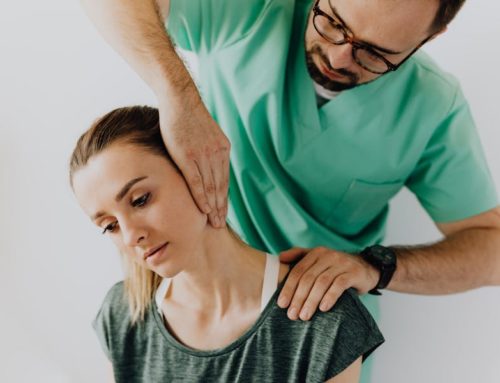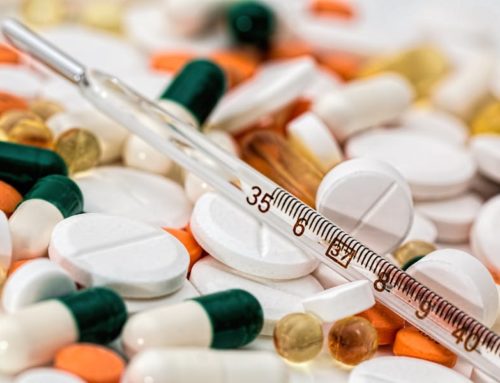Polycystic Ovary Syndrome (PCOS) Overview
PCOS is one of the most common endocrine and metabolic disorders in premenopausal women. It affects around 1 in every 10 women. (1)
If you have this syndrome, she may not only have irregular periods and cysts on her ovaries. She can also experience acne, cardiovascular issues, elevated androgen levels, insulin resistance, metabolic disorders, and obesity.
Early diagnosis and treatment are important to manage and treat this condition. The signs and symptoms of PCOS often develop around the time of your first menstrual period, but symptoms may not surface until the mid-20s. Because symptoms may be attributed to other causes or go unnoticed, PCOS may go undiagnosed for quite some time.
Androgen is considered a male hormone (testosterone), but women have androgen hormones too. Androgen levels are high in women with PCOS, which can lead to a variety of symptoms. (2, 3)
The symptoms of PCOS are: (4)
- Acne
- Darkening of skin in patches
- Depression
- Excess body and facial hair
- Fatigue
- Headaches
- Infertility
- Irregular or heavy periods
- Obesity or weight gain
- Ovarian cysts
- Pelvic pain
- Sleep problems
- Thinning hair on the head
Many PCOS symptoms can also be attributed to other disorders and conditions. This is why, as a practitioner, you can address PCOS with a foundational approach and get to the root cause.
Endometriosis Overview
Much like PCOS, endometriosis has a significant impact on women of reproductive age. Nearly 10% of women in this age group, or 190 million women globally, experience endometriosis. (5)
Endometriosis can cause intense pelvic pain during menstruation that may increase over time.
You may experience several severe symptoms, or no symptoms at all — the severity of symptoms and the probability of diagnosis increase with age.
The common signs and symptoms of endometriosis are: (6)
- Chronic lower abdominal pain
- Chronic lower back pain
- Excessive bleeding
- Infertility
- Painful intercourse
- Painful urination
- Recurrent painful periods
PCOS vs. Endometriosis
Although PCOS and endometriosis are two different conditions, they have many similarities. Both come from hormonal imbalance or disruption, such as estrogen dominance. Both will show abnormal inflammation markers in blood tests.
As PCOS and endometriosis are both hormonal conditions, they share symptoms like abdominal pain, heavy or irregular bleeding, and infertility. They can also be difficult to diagnose since many of the symptoms overlap with other health complications.
To further complicate the diagnosis process, it’s possible to have both conditions at once. As a healthcare provider, you can run tests and review symptoms that will determine whether you have PCOS, endometriosis, or both. However, at the end of the day, these hormonal conditions share similar root causes to target for whole-body healing. (7, 8)
Potential Root Causes of PCOS and Endometriosis
As of now, the medical community is in the dark about what directly causes these conditions. But as a practitioner, you know that only addressing the symptoms will do nothing for your long-term healing journey.
Because toxins can play a role in both conditions, guiding you through a detox protocol is extremely helpful in treating PCOS and endometriosis. Let’s take a look at different toxins and how they can trigger these reproductive conditions.
Bisphenol A (BPA) is an industrial chemical used to make certain resins and plastics that store food and beverages. If BPA gets into the body, it can wreak havoc on the endocrine system, worsening symptoms. Studies show the harm can be transgenerational, especially affecting the delicate hormonal balance regulating female fertility and the menstrual cycle. Removal of this toxin is vital in addressing the root cause of both conditions. (9, 10)
Glyphosate can disrupt organ and endocrine function, and so can be a significant factor in these conditions. Removal of this toxin is essential to manage both disorders. More studies on the role glyphosate plays in hormonal conditions are needed, but the existing studies show that glyphosate can harm female hormones, possibly contributing to PCOS and endometriosis. (11, 12)
Heavy metals (lead, cadmium, arsenic, mercury) are toxic in certain oxidative states. Heavy metal contamination comes from fertilizers, fossil fuels, industrial pollutants, poor wastewater management, vehicle emissions, etc. An accumulation of these in the body can lead to endocrine disorders, hormonal conditions, and infertility. (13)
Mold and mycotoxins can be hiding just about anywhere, from food to surfaces and moist areas of your home. Exposure to mold and mycotoxins can interrupt the delicate balance of female hormones. If you have been exposed to mold, extreme fatigue, heavy periods, menstrual irregularities, and weight gain may be attributed to these conditions. (14, 15)
Helpful Lifestyle Changes for Hormonal Dysfunction
PCOS and endometriosis are complex conditions that require multifaceted approaches to treat. Physical activity and a healthy, unprocessed whole-food diet can positively affect each disorder.
Although PCOS and endometriosis are very different, they are similar in that they involve hormone imbalance and inflammation. Avoiding certain foods can help lessen the symptoms of both conditions, as well as incorporating micronutrients and certain botanicals. (16)
Foods to Avoid for Endometriosis
Certain foods have been shown to exacerbate the symptoms of endometriosis. To lessen the symptoms, make sure you avoid the following.
- Alcohol — Alcohol can raise estrogen levels, which can worsen your symptoms of endometriosis. (17)
- Dairy — Dairy is known to trigger the symptoms of endometriosis via an inflammatory response. (18)
- Gluten — Gluten is an inflammatory agent. It is also often laden with pesticides, and having you eliminate it from her diet can greatly reduce her symptoms. (19)
Foods to Avoid for PCOS
The following foods are known to exacerbate the symptoms of PCOS. Eliminating these from her diet can help reduce the symptoms of PCOS.
- Coffee — The caffeine in coffee can increase stress hormones, which in turn increase insulin levels. Caffeine can also disrupt sleep and promote anxiety. Plus, the acidity of coffee can cause digestive issues, gut microbiome imbalances, heartburn, and indigestion. (20)
- Seed oils — Seed oils are used in processed foods because they are inexpensive and don’t have much flavor, making them easy to use in any food product. Seed oils include canola oil, rapeseed oil, safflower oil, sunflower oil, and vegetable oil. These types of oils can cause inflammation, one of the primary sources of hormonal imbalances. (21)
- Soy — Soy contains plant estrogen that acts like estrogen in the body, and eating too much of it can make the body think it has enough in supply. Because of this, it can slow down or stop ovulation. (22)
Foods to Help for Endometriosis and PCOS
The following food categories may help alleviate endometriosis and PCOS symptoms:
- High-fiber foods — Foods high in fiber like beans, fresh fruit, raw vegetables, unrefined grains, and whole grain pasta are helpful in moderation. However, if eaten in excess, these foods can alter hormone levels and contribute to female hormonal issues. (23)
- Low glycemic index foods — Foods that drastically raise your blood sugar levels can accelerate your condition. Recommend you stick with low glycemic index foods like bran breakfast cereals, chickpeas, green vegetables, kidney beans, lentils, most fruits, and raw carrots. (24, 25)
- Low-saturated fat foods — High-fat foods can increase inflammation, which contributes to hormonal imbalances. Look for low-saturated, anti-inflammatory foods, like fish, fruits, nuts, poultry, vegetables, and whole grains. (26)
Micronutrients, PCOS, and Endometriosis
Micronutrients significantly affect hormones, especially insulin. Insulin resistance is common in people with PCOS and contributes to the weight gain associated with the condition. Chromium, lipoic acid, and vitamin D are other nutrients that become deficient in women with PCOS. Deficiencies in these micronutrients can affect fertility, glucose control, hormone production, and weight management. (27)
For endometriosis, several micronutrients are vital to counteract its effects on the body. Deficiencies of vitamins B6, C, D, and E significantly affect hormone levels in women. In turn, this causes issues with anxiety, breast pain, excessive estrogen production, menstrual regularity, and ovulation.
Instructing you to consume more of these micronutrients can not only help control and alleviate the symptoms of hormonal conditions but can support her body while you guide her through a detox protocol. (28)
Natural Herbs and Products for Hormonal Conditions
Because there is a strong link between PCOS, endometriosis, and toxins, it is vital to address drainage, mitochondrial function, and whole-body detox as you deal with these conditions.
Incorporating certain herbs and products can reduce your symptoms of PCOS and endometriosis, as well as promote healing at the root level. These include: (29)
- Advanced TUDCA promotes the body’s natural detoxification functions to flush out unwanted toxins interfering with your hormonal balance. (30)
- BioToxin Binder can help support your body as it removes environmental disruptors, like mold and mycotoxins. (31, 32)
- Black cohosh is a phytoestrogen that helps regulate ovulation, endometrial thickness, and the number and frequency of hot flashes. (33, 34)
- Chasteberry can help treat endometriosis by raising progesterone levels and lowering estrogen levels. It can also help both disorders by lowering pain levels and reducing bleeding. (35)
- Chinese peonies can help lessen heavy bleeding and regulate ovulation. (36)
- Cinnamon can reduce heavy bleeding and menstrual pain. (37)
- CT-Minerals help replenish lost minerals and essential nutrients lacking with PCOS and endometriosis.
- GCO supports your blood sugar levels that become imbalanced from these conditions, causing insulin resistance.
- HM-ET Binder helps remove pesticides and herbicides, including glyphosate, which can harm healthy hormonal production.
- IFC helps lower inflammation levels caused by both PCOS and endometriosis in your body.
- ViRadChem Binder addresses the chemical toxins, retroviruses, and viruses that can contribute to your hormonal conditions and symptoms.
PCOS and endometriosis are frustrating, debilitating conditions that affect thousands of women around the world. Because PCOS and endometriosis have similar symptoms and root causes, you as a practitioner can address issues like glyphosate, heavy metals, insulin resistance, mold, and mycotoxins to help you get to the root of her symptoms, guiding her back to full health.







